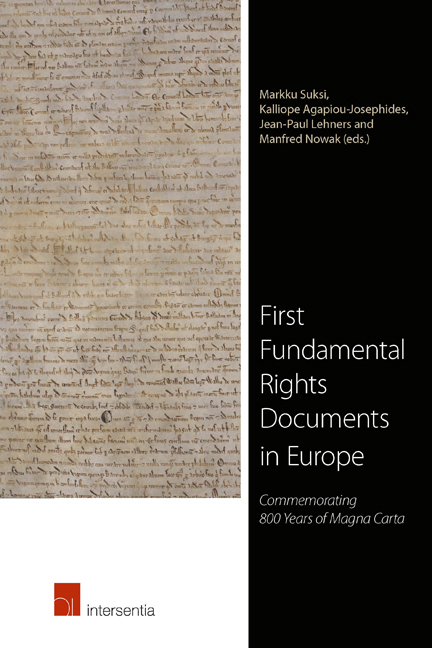Book contents
- Frontmatter
- Preface
- Contents
- List of Authors
- 1 Introduction
- PART I
- PART II
- 11 France: Foundational Importance of the Declaration of 1789
- 12 Sweden: Free Press as a First Fundamental Right
- 13 The Netherlands: The Batavian Staatsregeling as the First Fundamental Rights Document
- 14 Portugal: ‘Tropical Versailles’ in the Beginning of the Nineteenth Century
- 15 Luxembourg: Fundamental Rights in a Small State
- 16 Greece: Reflections from the Hellenic Legal Tradition
- 17 Denmark: In Love with Tradition
- 18 Germany: Fundamental Rights as an Instrument Towards the Rechtstaat
- 19 The Czech Republic: On the Road to Rights and Freedoms
- 20 Romania: The Birth of Fundamental Rights as a Form of Political Contention
- 21 Bulgaria: The Liberal Tarnovo Constitution
- 22 Finland: Rights to Facilitate Participation
- 23 Estonia: First Landmarks of Fundamental Rights
- 24 Slovakia: The Right of a Nation
- 25 Latvia: Second Part of the Constitution as a Project for Next Generations
- 26 The History of Fundamental Rights in Europe: A Long and Winding Road
- Index
13 - The Netherlands: The Batavian Staatsregeling as the First Fundamental Rights Document
from PART II
Published online by Cambridge University Press: 15 December 2017
- Frontmatter
- Preface
- Contents
- List of Authors
- 1 Introduction
- PART I
- PART II
- 11 France: Foundational Importance of the Declaration of 1789
- 12 Sweden: Free Press as a First Fundamental Right
- 13 The Netherlands: The Batavian Staatsregeling as the First Fundamental Rights Document
- 14 Portugal: ‘Tropical Versailles’ in the Beginning of the Nineteenth Century
- 15 Luxembourg: Fundamental Rights in a Small State
- 16 Greece: Reflections from the Hellenic Legal Tradition
- 17 Denmark: In Love with Tradition
- 18 Germany: Fundamental Rights as an Instrument Towards the Rechtstaat
- 19 The Czech Republic: On the Road to Rights and Freedoms
- 20 Romania: The Birth of Fundamental Rights as a Form of Political Contention
- 21 Bulgaria: The Liberal Tarnovo Constitution
- 22 Finland: Rights to Facilitate Participation
- 23 Estonia: First Landmarks of Fundamental Rights
- 24 Slovakia: The Right of a Nation
- 25 Latvia: Second Part of the Constitution as a Project for Next Generations
- 26 The History of Fundamental Rights in Europe: A Long and Winding Road
- Index
Summary
INTRODUCTION
This article gives a short overview of the evolution of fundamental rights from medieval ‘liberties’, through the developments in the Dutch Republic in the early modern period, until the first modern constitution, i.e. the Batavian Constitution of 1 May 1798.
In the Netherlands the first fundamental rights documents were issued by dukes and counts in the territories, which nowadays form part of the kingdoms of Belgium and the Netherlands, in the form of privileges for the individual towns in their realms. The late thirteenth and early fourteenth centuries heralded the beginning of a fundamental rights movement on the aggregate level of counties and duchies, at first in Flanders and Brabant, where nobility and cities combined their efforts to maintain their rights against arbitrary rule by their lords.
These first fundamental rights documents on the local and provincial level are very similar to the Magna Carta of 1215 in England, as the example of the Charter of Kortenberg shows. The main goal of the Charter of Kortenberg (1312) is the protection of the privileges and liberties of the nobility and towns of the Duchy of Brabant. Against the background of infractions against ‘the law of the land’, Duke John II of Brabant solemnly promised to maintain the country ‘by law and judgement’ (‘te wette ende te vonnisse’) (article 2), thus guaranteeing the people of Brabant judgment according to their laws and liberties. A permanent commission of four knights and ten representatives of the towns of Leuven, Brussels, Antwerp, ‘s-Hertogenbosch, Tienen and Zoutleeuw, the so-called ‘Council of Kortenberg’, was created to oversee the execution of the Charter (article 4). In the event of non-compliance with the orders of the Council, the courts of law were allowed to stop administering law and the nobility and towns were given the right to deny service to the duke, until he amended his ways (article 7, article 10).
According to Coopmans there is a strong connection between the medieval principle of ‘te wette en te vonnisse’ and the prevention of arbitrary behaviour by the government. The subjection of government to the rule of law and rules of due process forms the nucleus of modern fundamental rights. These principles protect subjects from arbitrary arrest by the government and arbitrary sentencing.
- Type
- Chapter
- Information
- First Fundamental Rights Documents in EuropeCommemorating 800 Years of Magna Carta, pp. 163 - 174Publisher: IntersentiaPrint publication year: 2015

